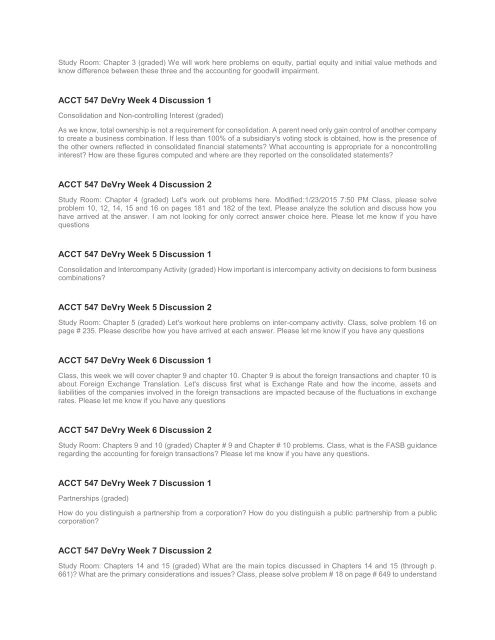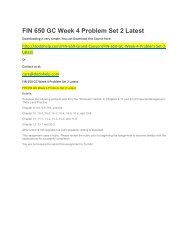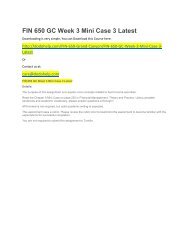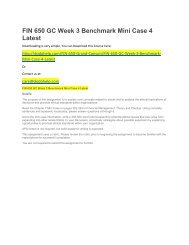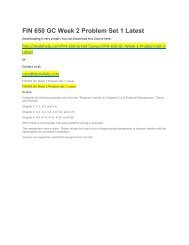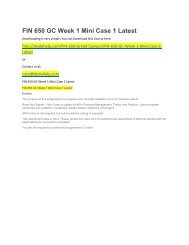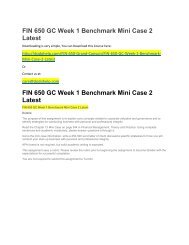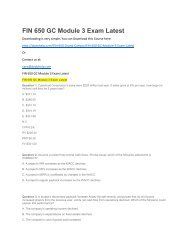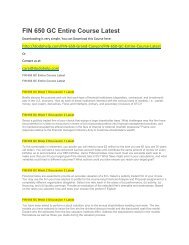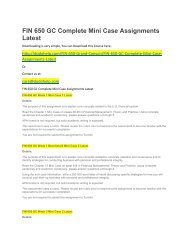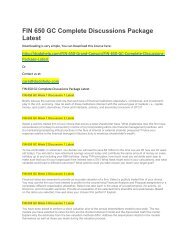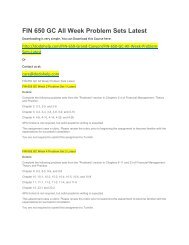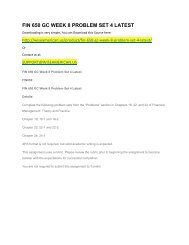ACCT 547 DeVry All Week Discussions
Create successful ePaper yourself
Turn your PDF publications into a flip-book with our unique Google optimized e-Paper software.
Study Room: Chapter 3 (graded) We will work here problems on equity, partial equity and initial value methods and<br />
know difference between these three and the accounting for goodwill impairment.<br />
<strong>ACCT</strong> <strong>547</strong> <strong>DeVry</strong> <strong>Week</strong> 4 Discussion 1<br />
Consolidation and Non-controlling Interest (graded)<br />
As we know, total ownership is not a requirement for consolidation. A parent need only gain control of another company<br />
to create a business combination. If less than 100% of a subsidiary's voting stock is obtained, how is the presence of<br />
the other owners reflected in consolidated financial statements? What accounting is appropriate for a noncontrolling<br />
interest? How are these figures computed and where are they reported on the consolidated statements?<br />
<strong>ACCT</strong> <strong>547</strong> <strong>DeVry</strong> <strong>Week</strong> 4 Discussion 2<br />
Study Room: Chapter 4 (graded) Let's work out problems here. Modified:1/23/2015 7:50 PM Class, please solve<br />
problem 10, 12, 14, 15 and 16 on pages 181 and 182 of the text. Please analyze the solution and discuss how you<br />
have arrived at the answer. I am not looking for only correct answer choice here. Please let me know if you have<br />
questions<br />
<strong>ACCT</strong> <strong>547</strong> <strong>DeVry</strong> <strong>Week</strong> 5 Discussion 1<br />
Consolidation and Intercompany Activity (graded) How important is intercompany activity on decisions to form business<br />
combinations?<br />
<strong>ACCT</strong> <strong>547</strong> <strong>DeVry</strong> <strong>Week</strong> 5 Discussion 2<br />
Study Room: Chapter 5 (graded) Let's workout here problems on inter-company activity. Class, solve problem 16 on<br />
page # 235. Please describe how you have arrived at each answer. Please let me know if you have any questions<br />
<strong>ACCT</strong> <strong>547</strong> <strong>DeVry</strong> <strong>Week</strong> 6 Discussion 1<br />
Class, this week we will cover chapter 9 and chapter 10. Chapter 9 is about the foreign transactions and chapter 10 is<br />
about Foreign Exchange Translation. Let's discuss first what is Exchange Rate and how the income, assets and<br />
liabilities of the companies involved in the foreign transactions are impacted because of the fluctuations in exchange<br />
rates. Please let me know if you have any questions<br />
<strong>ACCT</strong> <strong>547</strong> <strong>DeVry</strong> <strong>Week</strong> 6 Discussion 2<br />
Study Room: Chapters 9 and 10 (graded) Chapter # 9 and Chapter # 10 problems. Class, what is the FASB guidance<br />
regarding the accounting for foreign transactions? Please let me know if you have any questions.<br />
<strong>ACCT</strong> <strong>547</strong> <strong>DeVry</strong> <strong>Week</strong> 7 Discussion 1<br />
Partnerships (graded)<br />
How do you distinguish a partnership from a corporation? How do you distinguish a public partnership from a public<br />
corporation?<br />
<strong>ACCT</strong> <strong>547</strong> <strong>DeVry</strong> <strong>Week</strong> 7 Discussion 2<br />
Study Room: Chapters 14 and 15 (graded) What are the main topics discussed in Chapters 14 and 15 (through p.<br />
661)? What are the primary considerations and issues? Class, please solve problem # 18 on page # 649 to understand


